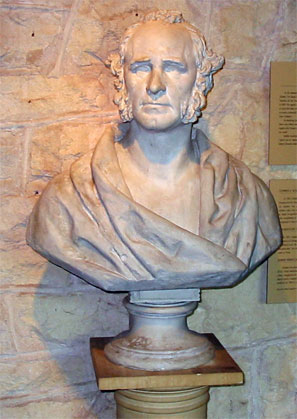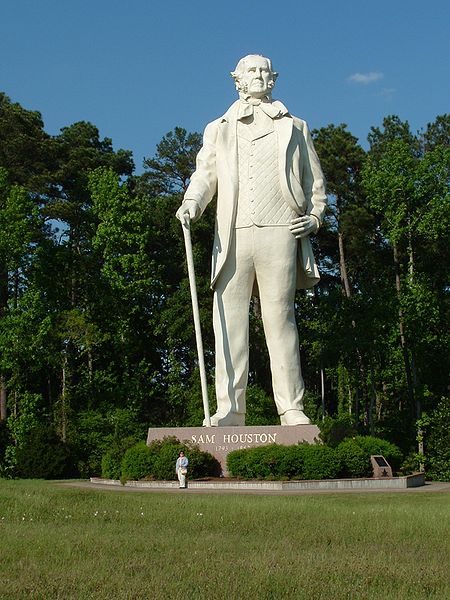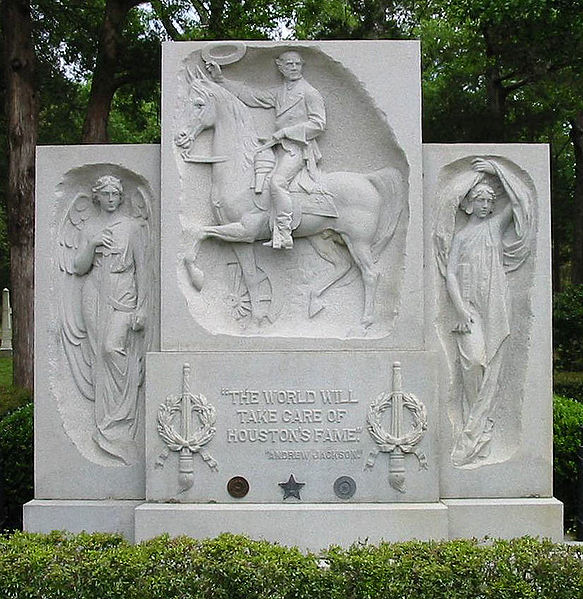<Back to Index>
- Physician Joel Roberts Poinsett, 1779
- Poet János Arany, 1817
- 1st President of the Republic of Texas Samuel Houston, 1793
PAGE SPONSOR
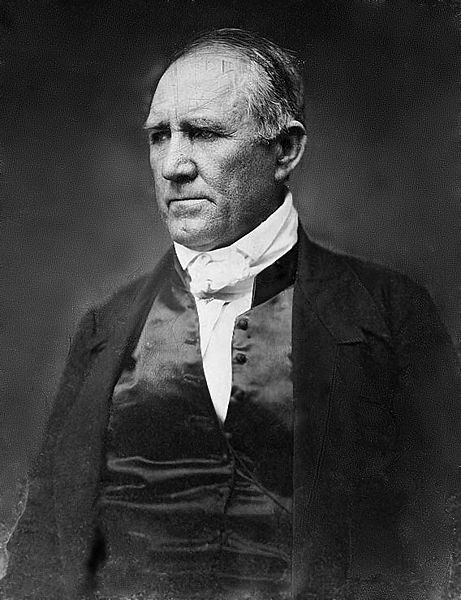
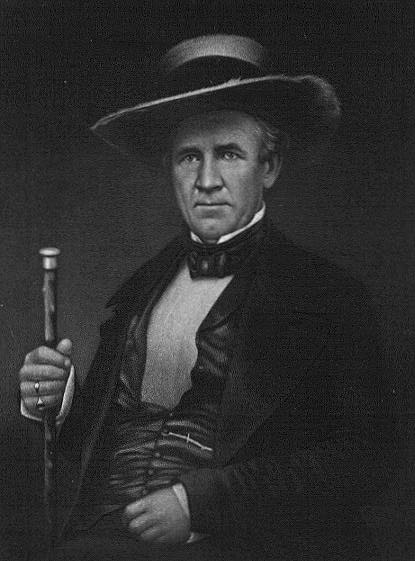
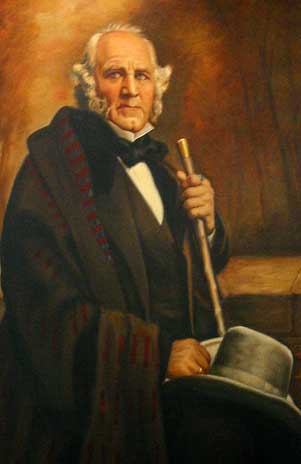
Samuel Houston, known as Sam Houston (March 2, 1793 – July 26, 1863), was a 19th century American statesman, politician, and soldier. He was born in Timber Ridge in the Shenandoah Valley of Virginia, of Scots - Irish descent. Houston became a key figure in the history of Texas, and was elected as the first and third President of the Republic of Texas, US Senator for Texas after it joined the United States, and finally as governor of the state. Although a slaveholder and opponent of abolitionism, he had unionist convictions. He refused to swear loyalty to the Confederacy when Texas seceded from the Union, and resigned as governor. To avoid bloodshed, he refused an offer of a Union army to put down the Confederate rebellion. Instead, he retired to Huntsville, Texas, where he died before the end of the Civil War.
His earlier life included migration to Tennessee from Virginia, time spent with the Cherokee Nation (into which he later was adopted as a citizen and took a wife), military service in the War of 1812, and successful participation in Tennessee politics. Houston is the only person in U.S. history to have been the governor of two different states (although other men had served as governors of more than one American territory). A fight with a US Congressman, followed by a high-profile trial, led to his emigration in 1832 to Mexican Texas. There he soon became a leader of the Texas Revolution. He supported annexation by the United States. The city of Houston was named after him and still is today. Houston's reputation was honored
after his death: posthumous commemoration has included a memorial
museum, a U.S. Army base, a national forest, a historical park, a university, and the largest free standing statue of an American. Sam
Houston was the son of Major Samuel Houston and Elizabeth Paxton.
Houston's ancestry is often traced to his great-great grandfather Sir
John Houston, who built a family estate in Scotland in the late 17th century. His second son John Houston emigrated to Ulster, Ireland, during the English plantation period. Under the system of primogeniture,
he did not inherit the estate. After several years in Ireland, John
Houston emigrated in 1735 with his family to the North American
colonies, where they first settled in Pennsylvania. As it filled with Lutheran German immigrants,
Houston decided to move his family with other Scots - Irish who were
migrating to lands in the Shenandoah Valley of Virginia. An
historic plaque in Townland tells the story of the Houston family. It
is located in Ballyboley Forest Park near the site of the original John
Houston estate. It is dedicated to "One whose roots lay in these hills whose ancestor John Houston emigrated from this area." The Shenandoah Valley had many farms of Scots - Irish migrants. Newcomers included the Lyle family of the Raloo area, who helped found Timber Ridge Presbyterian Church. The Houston family settled nearby. Gradually John developed his land and purchased slaves. Their son Robert inherited his father's land. His youngest of five sons was Samuel Houston. Samuel Houston became a member of Morgan's Rifle Brigade and was commissioned a major during the American Revolutionary War. At the time militia officers were expected to pay their own expenses.
He had married Elizabeth Paxton and inherited his father's land, but he
was not a good manager and got into debt, in part because of his
militia service. Their children were born on his family's plantation near
Timber Ridge Church, including Sam Houston on March 2, 1793, the fifth
of nine children and the fifth son born. Planning to move on as people
did on the frontier to leave debts behind, the elder Samuel Houston
patented land in Maryville eastern
Tennessee near relatives. He died in 1807 before he could move with his
family, and they moved on without him: Elizabeth taking their five sons
and three daughters to the new state. Having received only a basic education on the frontier, young Sam was 14 when his family moved to Maryville. In
1809, at age 16, Houston ran away from home, because he was
dissatisfied to work as a shop clerk in his older brothers' store. He went southwest, where he lived for a few years with the Cherokee tribe led by Ahuludegi (also spelled Oolooteka) on Hiwassee Island, on the Hiwassee River above its confluence with the Tennessee. Having become chief after his brother moved west in 1809, Ahuludegi was known to the European Americans as John Jolly. He became an adoptive father to Houston, giving him the Cherokee name of Colonneh, meaning "the Raven". Houston
learned fluent Cherokee, while visiting his family in Maryville every
several months. Finally he returned to Maryville in 1812, and at age
19, Houston founded a one-room schoolhouse. This was the first school built in Tennessee, which had become a state in 1796. In 1812 Houston reported to a training camp in Knoxville, Tennessee, and enlisted in the39th Infantry Regiment to fight the British in the War of 1812. By December of that year, he had risen from private to third lieutenant. At the Battle of Horseshoe Bend in March 1814, he was wounded in the groin by a Creek arrow. His wound was bandaged, and he rejoined the fight. When Andrew Jackson called on volunteers to dislodge a group of Red Sticks from their breastwork (fortification),
Houston volunteered, but during the assault he was struck by bullets in
the shoulder and arm. He returned to Maryville as a disabled veteran,
but later took the army's offer of free surgery and convalesced in a New Orleans, Louisiana hospital. Houston
became close to Jackson, who was impressed with him and acted as a
mentor. In 1817 Jackson appointed him sub-agent in managing the
business relating to Jackson's removal of the Cherokees from East
Tennessee to a reservation in what is now Arkansas. He had differences with John C. Calhoun, then Secretary of War,
who chided him for appearing dressed as a Cherokee at a meeting. More
significantly, an inquiry was begun into charges related to Houston's
administration of supplies for the Indians. Offended, he resigned in
1818. Following
six months of study at the office of Judge James Trimble, Houston
passed the bar examination in Nashville, after which he opened a legal
practice in Lebanon, Tennessee. He was appointed attorney general of the Nashville district in late 1818, and was also given a command in the state militia. In 1822 Houston was elected to the US House of Representatives for Tennessee, where he was a staunch supporter of fellow Tennessean and Democrat Andrew Jackson.
He was widely considered to be Jackson's political
protégé, although their ideas about appropriate treatment
of Native Americans differed greatly. Houston was a Congressman from
1823 to 1827, re-elected in 1824. In 1827 he declined to run for re-election to Congress. Instead he ran for, and won, the office of governor of Tennessee, defeating the former governor, William Carroll. He planned to stand for re-election in 1828, but resigned after the dissolution of his first marriage. On January 22, 1829, at the age of 35, Houston married 19-year-old Eliza Allen of Gallatin, Tennessee. Houston's friends thought he was genuinely in love with the girl, the daughter of the well connected planter John Allen.
However, something happened between them; Eliza left him shortly after
the marriage and returned to her father, for reasons Houston refused to
discuss. Eliza Allen never said explicitly what had happened, but there
were rumors she had loved another man. The
separation attracted attention and caused controversy for the couple.
They were finally divorced in 1837, after he was elected President of
Texas. In April 1829, Houston resigned as governor of Tennessee and went west with the Cherokee to exile in Arkansas Territory. That year he was adopted as a citizen in the nation. Under Cherokee law, he married Diana Rogers Gentry, a part-Cherokee widow in her mid 30s. They lived together for several years. After declining to accompany Houston to Texas in 1832, she later married John McGrady. In 1838 Diana died of pneumonia. On May 9, 1840, in Marion, Alabama, Houston at age 47 married for a third time, to the 21-year-old Margaret Moffette Lea.
They had eight children together. She acted as a tempering influence on
Houston and he stopped drinking. Although the Houstons had numerous
houses, they kept only one continuously, Cedar Point (1840 – 1863) on Trinity Bay.
Houston went west and lived again among the Cherokee in the Arkansas Territory, who in October 1829 formally adopted him as a citizen of their nation. He set up a trading post (Wigwam Neosho) near Fort Gibson, Cherokee Nation, by the Verdigris River near its confluence with the Arkansas. Because of his heavy drinking, the Cherokee gave him a nickname meaning "Big Drunk". During this time Houston was interviewed by the author Alexis de Tocqueville,
who was traveling in the United States and its territories. Houston's
abandonment of his gubernatorial office and his wife, and his alleged
drunkenness, all caused a rift with his mentor President Jackson. They
were not reconciled for several years. In
1830 and again in 1832 Houston visited Washington, DC to expose the
frauds which government agents committed against the Cherokee. While he was in Washington in April 1832, anti-Jacksonian Congressman William Stanbery of Ohio made
accusations about Houston in a speech on the floor of Congress.
Attacking Jackson through his protégé, Stanbery accused
Houston of being in league with John Van Fossen and Congressman Robert S. Rose.
The three men had bid on supplying rations to the various tribes of
Native Americans who were being forcibly relocated because of Jackson's Indian Removal Act of 1830. After Stanbery refused to answer Houston's letters about the accusation, Houston confronted him on Pennsylvania Avenue and beat him with a hickory cane. Stanbery drew one of his pistols and pulled the trigger—the gun misfired. On April 17 Congress ordered Houston's arrest. Pleading self-defense, he hired Francis Scott Key as his lawyer. Houston was found guilty, but thanks to highly placed friends (among them James K. Polk), he was only lightly reprimanded. Stanbery filed charges against Houston in civil court. Judge William Cranch found Houston liable, and fined him $500. Houston left the United States for Mexico, without paying the fine. The
publicity surrounding the trial raised Houston's unfavorable political
reputation. He asked his wife Diana Rodgers to go with him to Mexican
Texas, but she preferred to stay at their cabin and trading post in
Oklahoma. She later married a man named Sam McGrady, and died of pneumonia in 1838. Houston married again after her death. Houston
left for Texas in December 1832, and was immediately swept up in the
politics of what was still a territory of the Mexican state of Coahuila-Texas.
Historians have speculated that Houston went to Texas at the request of
President Jackson to seek US annexation, but have found no supporting
documentation of the theory. Attending the Convention of 1833 as representative for Nacogdoches, Houston emerged as a supporter of William Harris Wharton and
his brother, who promoted independence from Mexico, the more radical
position of the American settlers and Tejanos in Texas. He also
attended the Consultation of 1835. The Texas Army commissioned him as Major General in
November 1835. He negotiated a peace settlement with the Cherokee of
East Texas in February 1836 to allay their fears about independence. At
the convention to declare Texan Independence in March 1836, he was made Commander-in-Chief. On March 2, 1836, his 43rd birthday, Houston signed the Texas Declaration of Independence. He soon joined his volunteer army at Gonzales, but retreated before the superior forces of Mexican General (and dictator) Antonio López de Santa Anna. Mexican soldiers killed all those at The Alamo Mission at the end of the Battle of the Alamo on March 6. At Goliad, Santa Anna ordered the execution of approximately 400 volunteer Texas militia, led by James Fannin, who had surrendered his forces. At the Battle of San Jacinto on April 21, 1836, Houston surprised Santa Anna and the Mexican forces during their afternoon siesta. Texas forces defeated them in less than 18 minutes. Badly beaten, Santa Anna was forced to sign the Treaty of Velasco,
granting Texas independence. Although Houston stayed on briefly for
negotiations, he returned to the United States for treatment of a wound
to his ankle. Houston was twice elected president of the Republic of Texas (the
first time on September 5, 1836). He served from October 22, 1836, to
December 10, 1838, and again from December 12, 1841 to December 9,
1844. On December 20, 1837, Houston presided over the convention of Freemasons that formed the Grand Lodge of the Republic of Texas, now the Grand Lodge of Texas. While he initially sought annexation by
the U.S., Houston dropped that goal during his first term. In his
second term, he strove for fiscal prudence, and worked to make peace
with the Native Americans. He also struggled to avoid war with Mexico,
whose forces invaded twice during 1842. In response to the Regulator - Moderator War of 1844, he sent in Republic militia to put down the warfare. The settlement of Houston was founded in August 1836 by brothers J.K. Allen and A.C. Allen. It was named in Houston's honor, and served as capital. Gail Borden helped lay out Houston's streets. In
1835, one year before being elected first President of the Republic of
Texas, Sam Houston founded the Holland Masonic Lodge. The initial founding of the lodge took place in Brazoria and was relocated to what is now Houston in 1837. The city of Houston served as the capital until President Mirabeau Lamar signed a measure that moved the capital to Austin on
January 14, 1839. Between his presidential terms (the constitution did
not allow a president to serve consecutive terms), Houston was a representative in the Texas House of Representatives for San Augustine. He was a major critic of President Mirabeau Lamar, who advocated continuing independence of Texas and the extension of its boundaries to the Pacific Ocean. After the annexation of Texas by the United States in 1845, Houston was elected to the U.S. Senate, along with Thomas Jefferson Rusk. Houston served from February 21, 1846, until March 4, 1859. He was a Senator during the Mexican - American War, when the U.S. defeated Mexico and acquired vast expanses of new territory in the Southwest as part of the concluding treaty. Throughout his term in the Senate, Houston spoke out against the growing sectionalism of
the country. He blamed the extremists of both the North and South,
saying: "Whatever is calculated to weaken or impair the strength of
[the] Union, – whether originating at the North or the South, – whether
arising from the incendiary violence of abolitionists, or from the coalition of nullifiers, will never meet with my unqualified approval." Houston supported the Oregon Bill in 1848, which was opposed by many Southerners. In his passionate speech in support of the Compromise of 1850, Houston said "A nation divided against itself cannot stand." Eight years later, Abraham Lincoln would express the same sentiment. Houston opposed the Kansas - Nebraska Act in
1854, and correctly predicted that it would cause a sectional rift in
the country that would eventually lead to war, saying: " ... what
fields of blood, what scenes of horror, what mighty cities in smoke and
ruins – it is brother murdering brother ... I see my beloved South go down in the unequal contest, in a sea of blood and smoking ruin." He was one of only two Southern senators (the other was John Bell of Tennessee)
to vote against the act. At the time, he was considered a potential
candidate for President of the United States. But, despite the fact
that he was a slave owner, his strong Unionism and opposition to the
extension of slavery alienated the Texas legislature and other southern States. Houston
twice ran for governor of Texas as a Unionist, unsuccessfully in 1857,
and successfully against Hardin R. Runnels in 1859. Upon election, he
became the only person in U.S. history to serve as governor of two
states, as well as the only governor to have been a foreign head of
state. Although Houston was a slave owner and opposed abolition, he opposed the secession of Texas from the Union. An elected convention voted to secede from the United States on February 1, 1861, and Texas joined the Confederate States of America on
March 2, 1861. Houston refused to recognize its legality, but the Texas
legislature upheld the legitimacy of secession. The political forces
that brought about Texas's secession were powerful enough to replace
the state's Unionist governor. Houston chose not to resist, stating, "I
love Texas too well to bring civil strife and bloodshed upon her. To
avert this calamity, I shall make no endeavor to maintain my authority
as Chief Executive of this State, except by the peaceful exercise of my
functions ... " He was evicted from his office on March 16, 1861, for
refusing to take an oath of loyalty to the Confederacy, writing, "Fellow-Citizens,
in the name of your rights and liberties, which I believe have been
trampled upon, I refuse to take this oath. In the name of the
nationality of Texas, which has been betrayed by the Convention, I
refuse to take this oath. In the name of the Constitution of Texas, I
refuse to take this oath. In the name of my own conscience and manhood,
which this Convention would degrade by dragging me before it, to pander
to the malice of my enemies, I refuse to take this oath. I deny the
power of this Convention to speak for Texas.... I protest.... against all
the acts and doings of this convention and I declare them null and void." He was replaced by Lieutenant Governor Edward Clark. To avoid more bloodshed in Texas, Houston turned down U.S. Col. Frederick W. Lander's
offer from President Lincoln of 50,000 troops to prevent Texas's
secession. He said, "Allow me to most respectfully decline any such
assistance of the United States Government." After
leaving the Governor's mansion, Houston traveled to Galveston. Along
the way, many people demanded an explanation for his refusal to support
the Confederacy. On April 19, 1861 from a hotel window he told a crowd: "Let
me tell you what is coming. After the sacrifice of countless millions
of treasure and hundreds of thousands of lives, you may win Southern
independence if God be not against you, but I doubt it. I tell you
that, while I believe with you in the doctrine of states rights, the
North is determined to preserve this Union. They are not a fiery,
impulsive people as you are, for they live in colder climates. But when
they begin to move in a given direction, they move with the steady
momentum and perseverance of a mighty avalanche; and what I fear is, they will overwhelm the South." In 1854, Houston, having made a profession of Christian faith, was baptized by Rev. Rufus C. Burleson. At the time Burleson was the pastor of the Independence Baptist Church in Washington County, which Houston and his wife attended. Then the wealthiest community in Texas, Independence had won the bid for Baylor College, where Burleson served as second president. Houston was also close friend of Rev. George Washington Baines, who preceded Burleson at the church. He was the maternal great-grandfather of President Lyndon B. Johnson. In 1862, Houston returned to Huntsville, Texas,
and rented the Steamboat House; the hills in Huntsville reminded him of
his boyhood home in Tennessee. Houston was active in the Masonic Lodge,
transferring his membership to Forrest Lodge #19. His health
deteriorated in 1863 due to a persistent cough. In mid-July, Houston
developed pneumonia.
He died on July 26, 1863 at Steamboat House, with his wife Margaret by
his side. His last recorded words were, "Texas! Texas! Margaret..." The inscription on his tomb reads: Sam
Houston was buried in Huntsville, Texas, where he lived in retirement;
his wife Margaret Lea was buried after her death in Independence at her
family's cemetery.
